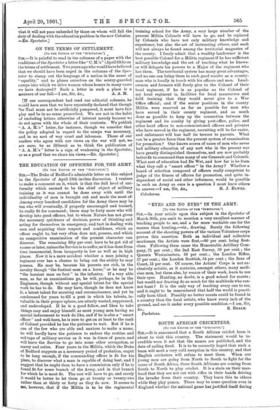THE EDUCATION OF OFFICERS FOR THE ARMY.
• [TO THE EDITOR OP THE "SPECTATOR."]
Sig,—The Duke of Bedford's admirable letter on this subject in the Spectator of April 13th invites discussion. I venture to make a comment on it, which is that the dull level of uni- formity which seemed to be the chief object of military training as it was cannot be done away with until the individuality of men is brought out and made the most of. Among every hundred candidates foi the Army there may be ten who will eventually, if properly encouraged and trained, be really fit for command; there may be forty more who will develop into good officers, but to whom Nature has not given the necessary quickness of decision, power of thinking and acting for themselves in emergency, and tact in dealing with men and acquiring their respect and confidence, which an officer ought to, but very often does not, possess, and which no competitive examination of the present character can discover. The remaining fifty per cent. have to be got rid of sooner or later, unless the Service is to suffer, as it has done from time .immemorial, from incapacity in low as well as in high places. Now it is a mere accident whether a man joining a regiment ever has a chance to bring out the ability he may possess. He may be, because his parents are rich, in the cavalry though "the footiest man on a horse," or he may be "the horsiest man on foot " in the infantry. If a very able man, as far as examinations go, he will, perhaps, be in the Engineers, though without any special talent for the special work he has to do. He may have, though he does not know it, a latent talent for scouting and reconnaissance, and yet be condemned for years to fill a post in which his talents, in- valuable in their proper sphere, are utterly wasted, suppressed, and undeveloped. If he is a good fellow, and likes to take . things easy and enjoy himself, as most young men having no special inducement to work do like, and if he is.also a " smart officer" and well-born, he is sure to get on at least to the rank of Colonel provided he has the patience to wait. But if he is one of the few who are able and anxious to make a name, he will hardly have the patience to endure the routine and red-tape of military service as it was in times of peace, and will leave the Service to go into some other occupation, or marry and retire. Four years in the Militia, which the Duke of Bedford suggests as a necessary period of probation, ought to be long enough, if the commanding officer is fit for his plate, to discover what a man • is capable of doing best, and I suggest that he ought then to have a commission only if he is found fit for some branch of the Army, and in that branch for which he is most fit. The rest will have to go, and surely it would be better to let them go at twenty or twenty-two rather than at thirty or forty as they do now. It seems to me, however, that if the Militia is to be the regimental training school for the Army, a very large number of the present Militia Colonels will have to go, and be replaced by Colonels who have not only military knowledge and experience, but also the art of instructing others, and such will not always be found among the territorial magnates of the county. I freely admit that a wealthy landowner is the best possible Colonel for a Militia regiment if he has sufficient military knowledge and the art of teaching what he knows, or will delegate his powers to a Major of the regiment who has them. The territorial system has many great advantages, and no one can bring them to such good results as a county- man who is locally in touch with his officers and men. Land- owners and farmers will freely give to the Colonel of their local regiment, if he is as popular as the Colonel of my local regiment is, facilities for local manoeuvres and field training that they would never give to a War Office official; and if the senior positions in the county Militia were reserved as far as possible for men who have served in their county regiment, and as much done as possible to keep up the connection between the regiment and its county by giving post-office, police, and other local offices to non-commissioned officers and privates who have served in the regiment, recruiting will be far easier, and enlistment will lose half its terrors to parents. What can be a greater farce than the present system of examination for promotion? One knows scores of cases of men who never had military education of any sort who in the present war have greatly distinguished themselves, and are now probably better fit to command than many of our Generals and Colonels. What sort of education had De Wet, and how far is he from what they call a "smart officer "• in the Army? Whether a board of selection composed of officers really competent to judge of the fitness of officers for promotion, and quite in- dependent of social and other influences, would be possible in such an Army as ours is a question I must leave others






































 Previous page
Previous page